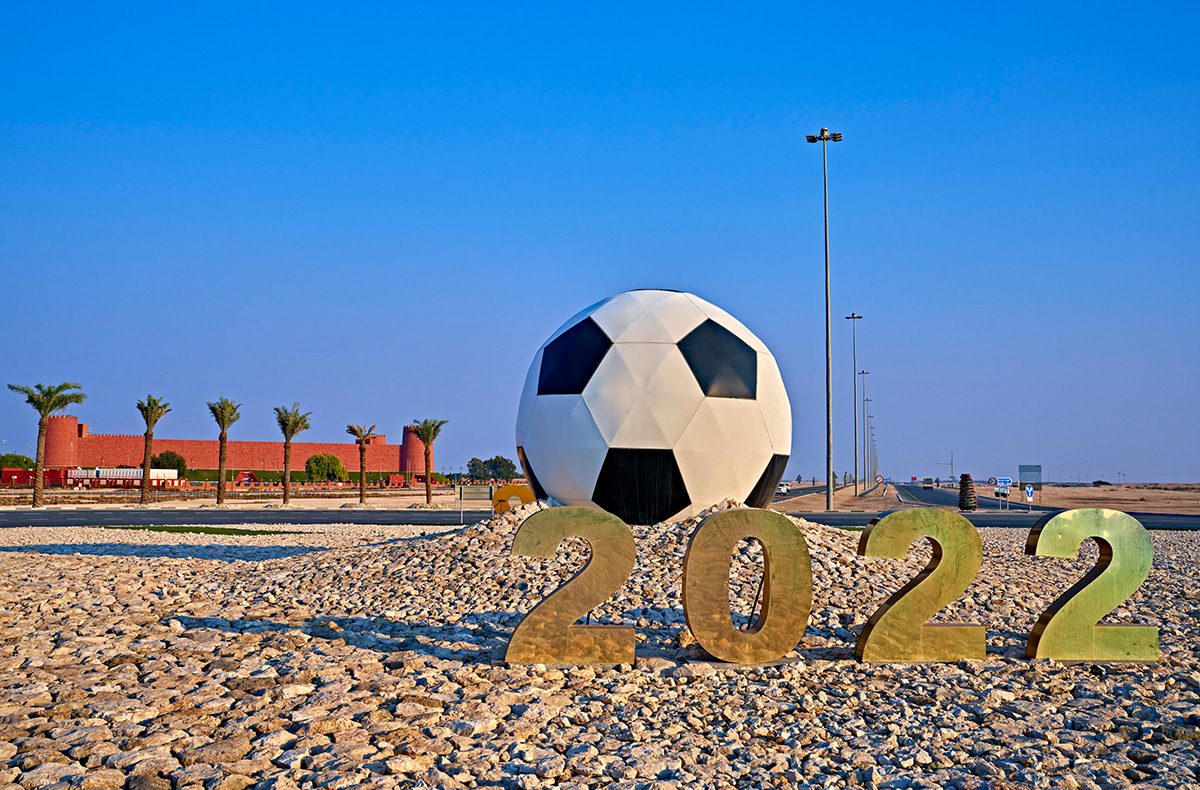
As the country of Qatar prepares to host the first mega sporting event in the MENA (Middle East and Northern Africa) region in November, it’s become a foregone conclusion that the capital city of Doha is transforming into a major international sports hub. Backed by hosting the Asian Games in 2009, the country has invested heavily in becoming a major player in the global sports market. To be frank, hosting the premier men’s soccer tournament is a monumental achievement for the country of Qatar, which will add up to $17 billion to the country’s economy. The goals of the Qatar National Vision 2030 view the 2022 FIFA World Cup as a major part of the country’s legacy for future opportunities to host the Olympics and change the standards for hosting global mega sporting events.
In 2010, Qatar’s organizing committee won the bid to host the 2022 FIFA Men’s Soccer World Cup. The country has spent the past 12 years redesigning and remodeling the city of Doha and multiple stadium sites throughout the country to transcend the hospitality and spectator experience for mega sporting events. Qatar’s government created the Supreme Committee for the Delivery and Legacy of the 2022 FIFA World Cup (SC), and H.E. Hassan Al-Thawadi was appointed as the Secretary-General on March 11, 2011.
The leader of the movement
Hassan Al-Thawadi’s official title of H.E. (His Excellency) confirms his status as Qatari government minister and his fiduciary duty to serve the country under the rule of current Emir H.H. (His Highness) Tamim Bin Hamad Al Thani. With the Secretary-General appointment, Hassan Al-Thawadi is the face of the country’s largest and most ambitious strategic endeavor. To date, the government of Qatar has committed over $6.5 billion to the multiple initiatives under the umbrella of the Supreme Committee. Al-Thawadi leads all aspects of the infrastructure upgrades and strategic coordination of the government and private entities in support of the 2022 FIFA World Cup. In addition to his role as the Secretary-General, Al-Thawadi serves as the Chairman of the collaboration between the SC and FIFA for the actual event staging and organizing of the FIFA World Cup.
By profession, Al-Thawadi is a lawyer who earned his degree from the University of Sheffield (UK). He has multiple years of high-level civil service as the General Counsel for the Qatar Investment Authority, and served as the General Counsel of Qatar Holding. Additionally, Al-Thawadi holds board positions on the Qatar International Islamic Bank, Qatar Chamber of Commerce and Industry, Katara Hospitality, and Msheireb Properties. Al-Thawadi is an impressive leader who has been groomed to lead this complicated endeavor which will ultimately change the future trajectory of the country of Qatar.
On paper, while Al-Thawadi’s credentials are very impressive, there is nothing like meeting him in person. Al-Thawadi is a wonder of a human being, whose diplomatic expertise, charm, and business acumen reminded me of a younger millennial version of Adam Silver, the innovative leader and Commissioner of the National Basketball Association (NBA). His creativity, optimism, and proactive energy were uncanny. During the 2017 United Nations General Assembly (in NYC), I was in attendance as Al-Thwadi hosted multiple heads of state in a private session where he was the rockstar of the event. He conducted media interviews in four languages (English, Arabic, Spanish, and French) and was simultaneously emphatic, compassionate, and endearing. As Al-Thawadi worked the room, navigating the highest levels of geopolitics and international business, I felt like I was in the presence of a true leader whose impact and influence on the world is just getting started. The potential for what he will bring to not only the country of Qatar but the greater sports world pales in comparison to what his leadership will bring to global business.
Negative publicity
The international spotlight that comes with hosting a mega-event has put the small Arabic nation of Qatar at the forefront of not only the sporting world, but greater society as a whole. Accusations of bribery came to light after they were awarded the FIFA World Cup bid in 2012, and there have been calls from international human rights interest groups for either Qatar to forfeit their gaming rights or for FIFA to strip the hosting duties, due to draconian workforce management practices such as “withholding” the passports of migrants on restricted work visas and poor living conditions. Additionally, accusations by Amnesty International about the multiple deaths of migrant workers have brought a dark cloud over Qatar’s viability as a worthy host of the 2022 FIFA World Cup.
According to The Guardian, 6500 migrant workers have died since Qatar was awarded the FIFA World Cup in 2010. These migrant workers are from Sri Lanka, Nepal, Pakistan, Bangladesh, and India. Their deaths have been connected to the breakneck pace of construction projects, such as the new public metro-rail system, hotels, roads, and a new airport, which are part of the country’s $200 Billion renovation plan.
A member organization of the international coalition of migrant rights groups, Human Rights Watch, created a global campaign called #PayUpFIFA to bring attention to the deaths. Also, on May 19, International Human Rights interest groups such as Fairsquare and Amnesty International joined Human Rights Watch in a campaign seeking for FIFA and the government of Qatar to provide a remedy for the extreme number of deaths. The remedy proposal requests a compensation fund for the families of migrant workers to receive a form of reparations for £350 million ($450 million).
Qatar’s response
Diplomatically, Qatar as a nation has addressed Workers’ Welfare as part of the pillars of the initiatives under the Supreme Committee alongside Generation Amazing, Challenge 22, Josoor Institute, and B4Development. According to the standards established by the Supreme Committee’s Workers’ Welfare Standards, Al-Thawadi’s leadership has established four prongs: 1. Creating consistent health and safety standards, 2. Prioritizing migrant workers’ health and safety in alignment with global standards, 3. Investment in research for informed policy making, 4. Improved record-keeping and data reporting. While this is a great start and shows a level of accountability to issues that have negatively impacted the country, I still believe strongly that more can be done.
Restorative over punitive
Per capita, Qatar is one of the wealthiest nations in the world and has benefited greatly from harnessing its oil and natural gas reserves. While the country has a total population of 3.2 million people, approximately 330,000 are Qatari citizens. The future of Doha as a major hub for sports business hinges on the government’s responses to requests for reparations from the International Human Rights interest groups.
I believe Qatar and FIFA should follow the precedent set by Germany in dealing with the legacy of the Holocaust through paying reparations to survivors. Germany has viewed reparations as “restorative” more so than “punitive”. Germany as a country has established the Holocaust Memorials in multiple cities throughout the country and since 1952, and according to the Claims Conference, has provided support to over 800,000 survivors for $70 billion. Additionally, during the initial stages of the COVID-19 pandemic in 2020, the government of Germany committed almost half a billion dollars towards continued support to the poorest survivors of the Holocaust. Not only has the German government committed to restoring the survivors of the Holocaust, but they have also continued to prove that their recompense does not expire after 75 years.
On multiple occasions in NYC and Doha, I have been fortunate to meet and speak with H.E. Hassan Al-Thawadi and have found him to be a transformative leader and a truly present and engaged individual. My challenge to him is to include a form of reparations or redemption to the families of the deceased migrant workers who were employed as part of the development efforts of the 2022 FIFA World Cup. These deaths will be tied to the legacy of the Qatar FIFA World Cup until the families of the survivors have been made whole. Only then can healing truly start to begin. I believe once this has occurred, the sporting and business accomplishments of the FIFA World Cup truly be celebrated. With the entire world focused on the country of Qatar, Hassan Al-Thawadi’s mettle will be tested in these moments; I believe he will make the right choice, as his legacy will also be at stake.



